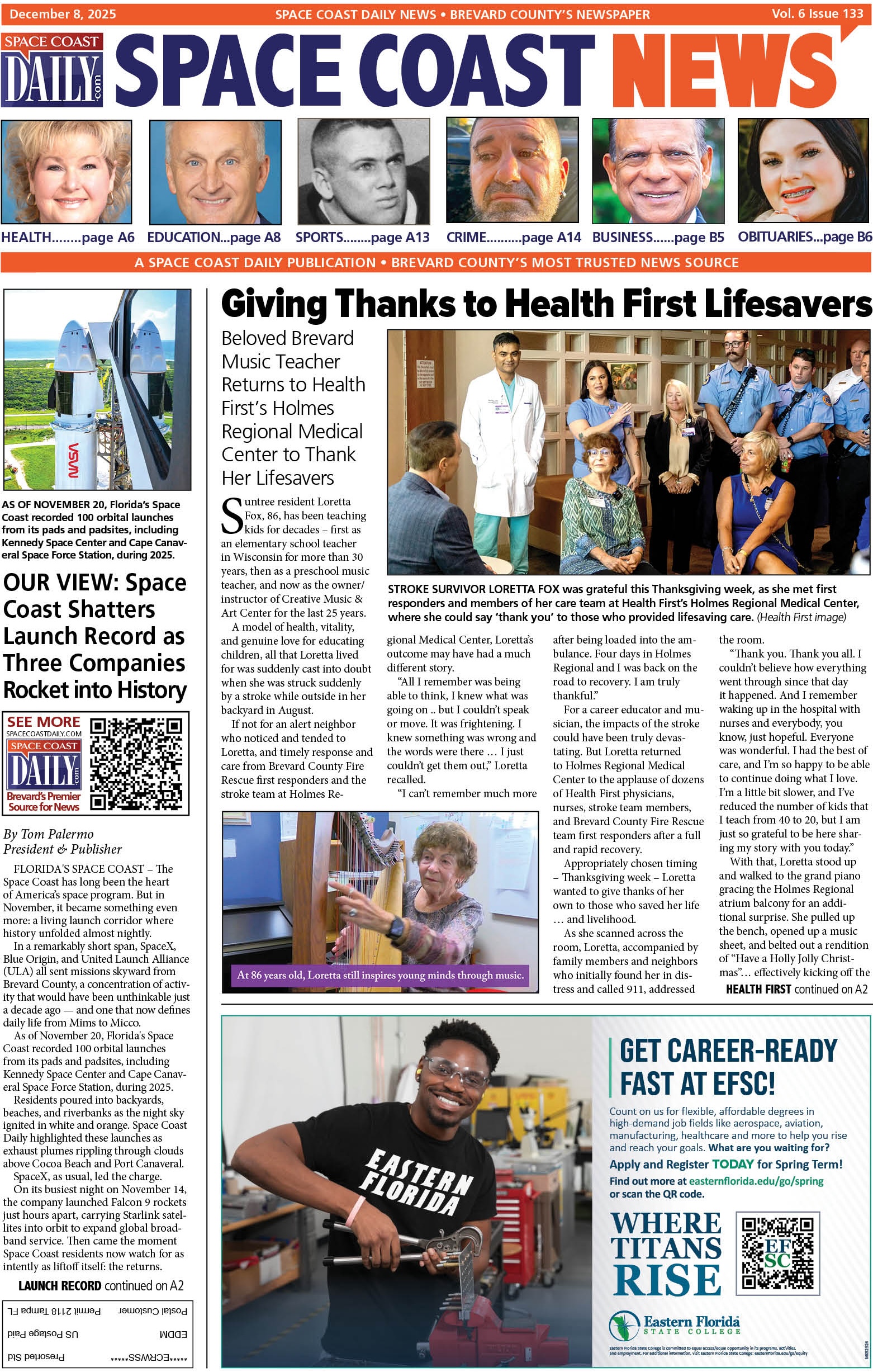Former Florida Tech Lacrosse Player Nate Menninger Living Out Extreme Adventures Around the Globe
By Florida Tech Information Center // August 27, 2020
One adventure Menninger always dreamed of was climbing the world's tallest mountain, Mount Everest
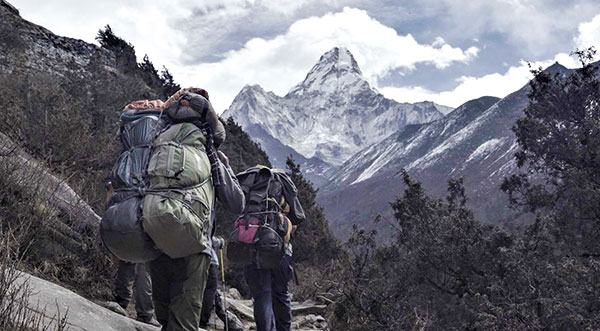
BREVARD COUNTY • MELBOURNE, FLORIDA – Former men’s lacrosse player Nate Menninger has spent the past five years living out some of the most extreme adventures around the globe.
Menninger, a native of Newton, Massachusetts, traveled to Pamplona, Spain in 2014, where he spent two months living and training alongside local, veteran bull-runners before competing in the historic Running of the Bulls.
The following summer he earned his scuba-diving certification and 36 hours later dove in the shark-infested Blue Hole in Belize.
He solo-backpacked through South America for six months to partake in bungee jumping and backcountry skiing in Chile and Argentina, including shredding the Super C Couloir- known as one of the best backcountry ski areas in the world.
He also high-altitude ice-climbed at the 20,305-foot Imja Tse in the Himalayas.
His affinity for adventure stems back to his youth.
“Growing up, we were super lucky that we traveled a lot,” he said.
“My dad grew up very blue-collar and would share stories that were beyond wild such as ice-racing and jumping motorcycles over rivers. As a kid, you want to emulate it and go to the next level. I took that with me in all my adventures.”
“I never really went into these things with any preparation. I wanted to prove the world that I could accomplish something that not many can do. I went in with a blank slate to see how quickly I could learn how to accomplish it. To me, the right way to do this was the most authentic way possible, just like the professionals and the people that live there.”
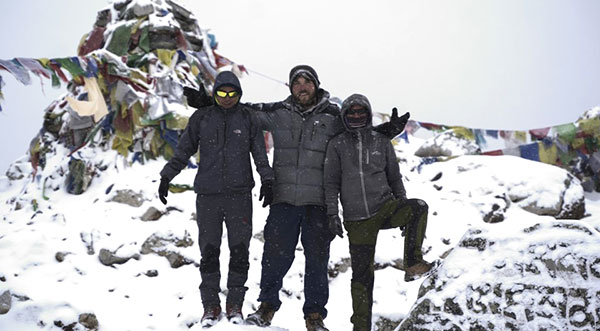
One adventure Menninger always dreamed of was climbing the world’s tallest mountain, Mount Everest. The main obstacle to him experiencing this feat was the expense of the trip.
It usually costs between $25,000 and $50,000 for a journey to Everest and was an amount of money he simply did not have.
However, while thinking back to past adventures in the Himalayan region, Menninger remembered the porters who aided the expeditioners.
Often called Sherpas, porters are employed by trekking companies and assist in expeditions by carrying bags and equipment of clients who make the venture through the Himalayas.
“I thought maybe I could get a job as a porter,” said Menninger.
“Aiding an expedition would let me climb Everest for essentially the cost of a plane ticket. The porters were able to experience Everest and didn’t have to pay for it. They got paid every day to do the treks. I thought I could do that.”
Instead of simply having the experience, he also wanted evidence of his goal to become one of the first ever foreign-born porters to aid a Mount Everest expedition.
So, he came up with the idea to film his trek to give viewers a look into their lives.
“My intention for the project was to celebrate their strength and physical prowess as well as their lifestyle,” he said.
The final product was a 55-minute documentary titled The Porter.
“I was trying to make a movie using my personal experience to highlight one of the world’s hardest and most physically demanding professions,” he said.
“But then I realized the film actually revealed a world of segregation, exploitation, and disturbingly low wages that porters deal with on a day-to-day basis.”
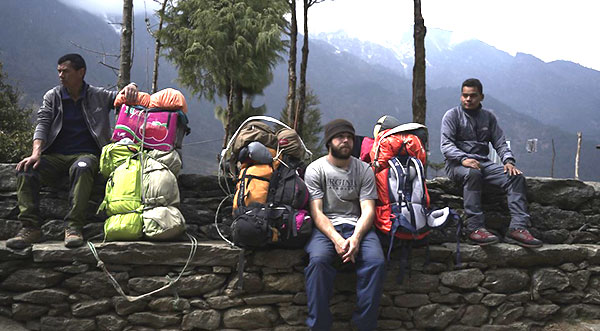
The film follows Menninger from the small Himalayan city of Jiri (altitude 6,300-feet) where he began the walk to meet the expeditioners in the village of Lukla (altitude 9,400-feet) to start his journey as a porter to Mount Everest’s base camp (altitude 17,600-feet) and back.
The roughly 230-mile out-and-back trip took Menninger 23 days to complete from late February to March 2019.
For the first week, he carried around 60 pounds of camera gear and supplies from Jiri to Lukla. Once the expedition began, Menninger increased the weight of the gear to 90 pounds and then a staggering 220 pounds by the 11th day of the trek.
He supported the weight using a head strap tied around the gear, called a namlo. As the film makes clear, it was a struggle.
“Private porters usually carry that amount of gear or more during a normal trek,” he explained.
“When I bumped the weight up and we got to higher elevations, my legs started shaking, it becomes harder to walk and my head was pounding. I just got rocked by everything.”
Most of the porters with whom Menninger worked in Nepal are members of the Tamang ethnic group. Menninger taught himself their language, Nepali, and asked them to treat him as they would one of their own.
They often tried to lighten his workload, but he’d push back.
“I would tell them ‘I want the exact same thing as what you’re eating. I want the same thing you’re drinking. If somebody is going to sleep on the bed, I want to sleep on the bed. What do you have in season? One blanket. OK, I’m only going to sleep with one blanket tonight.’
“I didn’t want to be different from them, like some kind of novelty, because I had a camera following me around.”
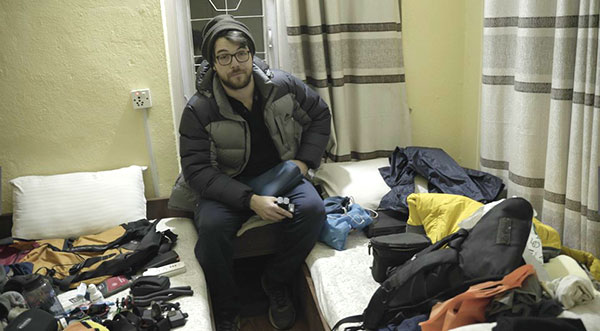
At the end of the film, when the expedition returns to Lukla and he finally relieves himself of the weight of the gear, you can really see toll the trip had taken on him.
“I didn’t realize during the trek, because you just have to keep moving, but I had lost about 20 pounds and had to crash for about two weeks afterwards,” he said.
Back in Lukla, each of the porters in his expedition received a $100 tip from the clients. In addition, each received $15 per day from the trekking company. Economically, this is usually not enough as the porters must pay for their food and lodging during the trek.
“Porters are paying about $7 a day for food, water and a place to sleep,” he explained. “As you get higher up, the prices go up and up and up. By the time you get near the end the price for these things is more than your daily salary. You’re actually losing money at that point.”
This creates a difficult economic situation and a heavy reliance on the tips provided by the clients. However, because clients are segregated from porters during a trek, they never get to witness what porters go through. As a result, tips are not always a reliable source of income.
“There are hard jobs all around the world,” Menninger said. “This is just one of them. It’s a job that’s very necessary for the environment. It’s just unfortunate the way that they’re paid.
“I’m not trying to say their work is bad. In fact, a lot of the people are proud of it. They’ll say, ‘How much do you carry?’ That’s a huge thing. You can be very proud of that, but you should just get compensated fairly, I believe. And this isn’t fair.”
Now that he is back in the United States, Menninger is trying to make his film available on as many platforms as possible. He feels a sense of duty to the porters to push this film and share his message and experience.
“I didn’t go into this trying to solve an issue and I wasn’t the type of person who was going to go out and attack it,” he said. “But I came out with this issue and had proof of it. What would any single human being do when you’re the only person that has this information and can share it. I think anyone would do the same thing. If I didn’t do this, who will?”
Many universities and climbing organizations have already shared and hosted showings of his documentary. The plight of the porters is gaining momentum around the world.
“These practices are unfair, exploitative, and have to change,” he says. “The issues are complex but to me, reform starts with visitors demanding their porters are getting paid fairly for the grueling work they’re doing. Porters should be treated with the respect and dignity they deserve.”
Menninger gives credit to several of his former teammates at Florida Tech for their support, including Nick Bailey and Lance Pavlina.
“Nick really is an amazing guy,” said Menninger. “When I was trying to get everything started for the documentary, he drove from his home in Maryland to help me shoot a promo video in Pittsburgh.
He also edited a lot with me. He did Skype calls with me to help edit the film. Nick did all of that just pro bono just to help the cause, to help me.
“Lance and Nick has always been really supportive of me. I love those guys! I lived with Lance a while ago when I first came to Florida Tech. Then when I came back down to Melbourne before taking the trip I stayed with him, where former teammate Tyler Oblong also lived, and he put me up for free. They are just great guys!”
Menninger joined the Florida Tech men’s lacrosse team ahead of the 2017 season after graduating from the Division I University of Virginia in 2016 where he played lacrosse for three years.
Prior to UVA, he attended and played lacrosse at Division III Hamilton College in New York.
He planned to play football and lacrosse at Tech, with the hope of becoming a professional athlete, before a multitude of injuries ended that dream and his time at the university.
“I came to Florida Tech to give it one last go,” he said. “When you’re an athlete, you’re very obsessed with it. But after the 2017 lacrosse season I was so broken down physically and realized this was it for sports. That was the first big step and led me to devoting my life full-fledge to the concept of living out these adventures.”
Despite the abrupt end to his playing career, Menninger is one of the only players in history to hold the claim that he has scored a goal at all three NCAA levels.
Over his career, he accumulated 11 total goals, including tallying five at Hamilton, one a UVA and five more during his one year at Florida Tech.







